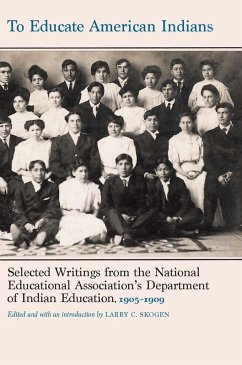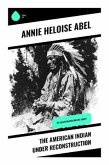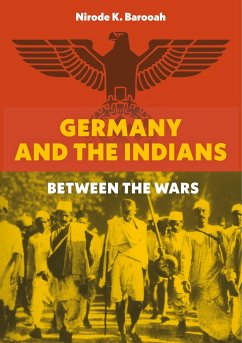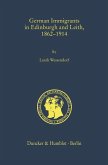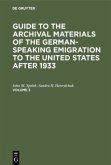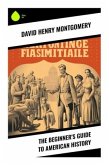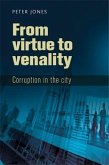Larry C. Skogen
To Educate American Indians
Selected Writings from the National Educational Association's Department of Indian Education, 1905-1909
Schade – dieser Artikel ist leider ausverkauft. Sobald wir wissen, ob und wann der Artikel wieder verfügbar ist, informieren wir Sie an dieser Stelle.
Larry C. Skogen
To Educate American Indians
Selected Writings from the National Educational Association's Department of Indian Education, 1905-1909
- Gebundenes Buch
- Merkliste
- Auf die Merkliste
- Bewerten Bewerten
- Teilen
- Produkt teilen
- Produkterinnerung
- Produkterinnerung
From 1900 to 1909, Indian school educators gathered at annual meetings of the National Educational Association’s Department of Indian Education. The papers they delivered were later published in the Journal of Proceedings and Addresses of the National Educational Association, but strict guidelines often meant they were heavily edited before publication. In this second volume of Department of Indian Education papers, Larry C. Skogen presents selected complete papers from the years 1905 to 1909 and provides historical context. During this period educators promoted the belief that Natives could…mehr
Andere Kunden interessierten sich auch für
![The American Indian Under Reconstruction The American Indian Under Reconstruction]() Annie Heloise AbelThe American Indian Under Reconstruction9,80 €
Annie Heloise AbelThe American Indian Under Reconstruction9,80 €![Germany and the Indians Germany and the Indians]() Nirode K. BarooahGermany and the Indians24,99 €
Nirode K. BarooahGermany and the Indians24,99 €![Killers of the Flower Moon Killers of the Flower Moon]() David GrannKillers of the Flower Moon7,49 €
David GrannKillers of the Flower Moon7,49 €![German Immigrants in Edinburgh and Leith, 1862-1914 German Immigrants in Edinburgh and Leith, 1862-1914]() Larah WessendorfGerman Immigrants in Edinburgh and Leith, 1862-191499,90 €
Larah WessendorfGerman Immigrants in Edinburgh and Leith, 1862-191499,90 €![Guide to the Archival Materials of the German-speaking Emigration to the United States after 1933. Volume 3 Guide to the Archival Materials of the German-speaking Emigration to the United States after 1933. Volume 3]() John M. SpalekGuide to the Archival Materials of the German-speaking Emigration to the United States after 1933. Volume 3208,99 €
John M. SpalekGuide to the Archival Materials of the German-speaking Emigration to the United States after 1933. Volume 3208,99 €![The Beginner's Guide to American History The Beginner's Guide to American History]() David Henry MontgomeryThe Beginner's Guide to American History13,30 €
David Henry MontgomeryThe Beginner's Guide to American History13,30 €![From Virtue to Venality From Virtue to Venality]() Peter JonesFrom Virtue to Venality126,99 €
Peter JonesFrom Virtue to Venality126,99 €-
-
-
From 1900 to 1909, Indian school educators gathered at annual meetings of the National Educational Association’s Department of Indian Education. The papers they delivered were later published in the Journal of Proceedings and Addresses of the National Educational Association, but strict guidelines often meant they were heavily edited before publication. In this second volume of Department of Indian Education papers, Larry C. Skogen presents selected complete papers from the years 1905 to 1909 and provides historical context. During this period educators promoted the belief that Natives could never be fully integrated into white society and argued instead for vocational and practical education near or on reservations, a clear break from earlier years, when prominent Indian school administrators advocated education far removed from Native communities. Indian school educators at these annual meetings also shared their methods with other educational thinkers and practitioners, who were seeking alternative pedagogies as new immigrants arrived in U.S. cities and challenges arose from new island territories. These selected writings reveal how the NEA influenced Indian school educators and how those educators, in turn, affected mainstream educational thinking.
Produktdetails
- Produktdetails
- Verlag: University of Nebraska Press
- Seitenzahl: 378
- Erscheinungstermin: 1. Dezember 2025
- Englisch
- Abmessung: 229mm x 152mm
- ISBN-13: 9781496240453
- ISBN-10: 1496240456
- Artikelnr.: 74981928
- Herstellerkennzeichnung
- Libri GmbH
- Europaallee 1
- 36244 Bad Hersfeld
- gpsr@libri.de
- Verlag: University of Nebraska Press
- Seitenzahl: 378
- Erscheinungstermin: 1. Dezember 2025
- Englisch
- Abmessung: 229mm x 152mm
- ISBN-13: 9781496240453
- ISBN-10: 1496240456
- Artikelnr.: 74981928
- Herstellerkennzeichnung
- Libri GmbH
- Europaallee 1
- 36244 Bad Hersfeld
- gpsr@libri.de
Larry C. Skogen is president emeritus of Bismarck State College, an independent historian, and a retired member of the U.S. Air Force. He is the editor of To Educate American Indians: Selected Writings from the National Educational Association’s Department of Indian Education, 1900–1904 and the author of Indian Depredation Claims, 1796–1920.
List of Illustrations Acknowledgments Introduction List of Abbreviations Part 1. Asbury Park and Ocean Grove
New Jersey
July 3–7
1905 1. Greeting to Indian School Educators Honorable John J. Fitzgerald
Member of the Committee on Indian Affairs
U. S. House of Representatives 2. Greeting to Indian School Educators Mary R. Campbell
Graduate Student in Philosophy
Johns Hopkins University
Baltimore
Maryland 3. Greeting to Indian School Educators Estelle Reel
Superintendent of Indian Schools
Washington DC 4. Music of the American Indian Natalie Curtis
New York City 5. Teaching Indian Pupils to Speak English Reuben Perry
Superintendent
Navajo Indian School
Fort Defiance
Arizona 6. Indian Characteristics Mary C. Judd
Minneapolis
Minnesota 7. The Advisability of Conducting Normal Schools to Train Teachers for the Specific Purpose of Instructing Indian Children John D. Benedict
Superintendent of Schools in Indian Territory 8. The Necessity for More and Better-Equipped Day Schools James J. Duncan
Day School Inspector
Pine Ridge Agency
South Dakota Part 2. Los Angeles
California
July 8-12
1907 9. Indians and Their Education Francis E. Leupp
Commissioner of Indian Affairs
Washington DC 10. Response to Greetings from Local Dignitaries Francis E. Leupp
Commissioner of Indian Affairs
Washington DC 11. Essential Features in the Education of the Child Race George P. Phenix
Superintendent of the Academic and Normal Departments
Hampton Normal and Agricultural Institute
Hampton
Virginia 12. Native Indian Art Angel De Cora
Instructor in Native Indian Art
Carlisle Indian Industrial School
Carlisle
Pennsylvania 13. Roundtable Conference Chairman-Francis E. Leupp
Commissioner of Indian Affairs
Washington DC (Question and Answer Portion) 14. Address Elmer Ellsworth Brown
U. S. Commissioner of Education
Washington DC 15. Manual Training in the Indian Schools Moses Friedman
Assistant Superintendent
Haskell Indian Institute
Lawrence
Kansas Part 3. Cleveland
Ohio
June 29-July 3
1908 16. Utilization of Experience in Home Environment Ella Flagg Young
Principal
Chicago Normal School
Chicago
Illinois 17. Progress the Indian is Making Toward Citizenship and Self-Support John H. Seger
Farm Manager
Seger Indian School
Colony
Oklahoma 18. How Far Are the Principles of Education Along Indigenous Lines Applicable to American Indians? G. Stanley Hall
President
Clark University
Worchester
Massachusetts 19. Commencement Exercise: An Oration Entitled “My People” Elisabeth Penny (Nez PercÉ)
Class of 1908
Carlisle Indian Industrial School
Carlisle
Pennsylvania Part 4. Denver
Colorado
July 3-9
1909 20. President’s Address: A ResumÉ of Indian Work Charles E. Burton
Superintendent
Grand Junction Indian School
Colorado 21. The Prevention of Tuberculosis in the Indian Schools Joseph A. Murphy
Medical Supervisor
U. S. Indian Service
Washington DC 22. Demonstration Lesson-Wheat and Bread Making Haskell Indian School Teachers and Students
Lawrence
Kansas 23. Our Educational Duties to the Indian James H. Baker
President
University of Colorado
Boulder
Colorado 24. Essential Features in the Education of the Child Races Charles Bartlett Dyke
Headmaster
State Preparatory School
Boulder
Colorado 25. The Teacher’s Responsibility to the Indian Child Sylvanus L. Heeter
Superintendent of Schools
St. Paul
Minnesota 26. Character-Building-The Foundation of Education John H. Phillips
Superintendent of Schools
Birmingham
Alabama 27. What Education Has Done for the Indian Hervey B. Peairs
Superintendent
Haskell Indian Institute
Lawrence
Kansas 28. Moral Training-Discussion George W. Cross
Principal
Tohatchi Indian School
Tohatchi
New Mexico 29. The Preservation of Aboriginal Arts Arthur J. Fynn
Principal
Longfellow School
Denver
Colorado 30. Elementary Industrial Training in the Day School S. Toledo Sherry
Day School Inspector
Standing Rock Agency
Fort Yates
North Dakota Conclusion Bibliography Index
New Jersey
July 3–7
1905 1. Greeting to Indian School Educators Honorable John J. Fitzgerald
Member of the Committee on Indian Affairs
U. S. House of Representatives 2. Greeting to Indian School Educators Mary R. Campbell
Graduate Student in Philosophy
Johns Hopkins University
Baltimore
Maryland 3. Greeting to Indian School Educators Estelle Reel
Superintendent of Indian Schools
Washington DC 4. Music of the American Indian Natalie Curtis
New York City 5. Teaching Indian Pupils to Speak English Reuben Perry
Superintendent
Navajo Indian School
Fort Defiance
Arizona 6. Indian Characteristics Mary C. Judd
Minneapolis
Minnesota 7. The Advisability of Conducting Normal Schools to Train Teachers for the Specific Purpose of Instructing Indian Children John D. Benedict
Superintendent of Schools in Indian Territory 8. The Necessity for More and Better-Equipped Day Schools James J. Duncan
Day School Inspector
Pine Ridge Agency
South Dakota Part 2. Los Angeles
California
July 8-12
1907 9. Indians and Their Education Francis E. Leupp
Commissioner of Indian Affairs
Washington DC 10. Response to Greetings from Local Dignitaries Francis E. Leupp
Commissioner of Indian Affairs
Washington DC 11. Essential Features in the Education of the Child Race George P. Phenix
Superintendent of the Academic and Normal Departments
Hampton Normal and Agricultural Institute
Hampton
Virginia 12. Native Indian Art Angel De Cora
Instructor in Native Indian Art
Carlisle Indian Industrial School
Carlisle
Pennsylvania 13. Roundtable Conference Chairman-Francis E. Leupp
Commissioner of Indian Affairs
Washington DC (Question and Answer Portion) 14. Address Elmer Ellsworth Brown
U. S. Commissioner of Education
Washington DC 15. Manual Training in the Indian Schools Moses Friedman
Assistant Superintendent
Haskell Indian Institute
Lawrence
Kansas Part 3. Cleveland
Ohio
June 29-July 3
1908 16. Utilization of Experience in Home Environment Ella Flagg Young
Principal
Chicago Normal School
Chicago
Illinois 17. Progress the Indian is Making Toward Citizenship and Self-Support John H. Seger
Farm Manager
Seger Indian School
Colony
Oklahoma 18. How Far Are the Principles of Education Along Indigenous Lines Applicable to American Indians? G. Stanley Hall
President
Clark University
Worchester
Massachusetts 19. Commencement Exercise: An Oration Entitled “My People” Elisabeth Penny (Nez PercÉ)
Class of 1908
Carlisle Indian Industrial School
Carlisle
Pennsylvania Part 4. Denver
Colorado
July 3-9
1909 20. President’s Address: A ResumÉ of Indian Work Charles E. Burton
Superintendent
Grand Junction Indian School
Colorado 21. The Prevention of Tuberculosis in the Indian Schools Joseph A. Murphy
Medical Supervisor
U. S. Indian Service
Washington DC 22. Demonstration Lesson-Wheat and Bread Making Haskell Indian School Teachers and Students
Lawrence
Kansas 23. Our Educational Duties to the Indian James H. Baker
President
University of Colorado
Boulder
Colorado 24. Essential Features in the Education of the Child Races Charles Bartlett Dyke
Headmaster
State Preparatory School
Boulder
Colorado 25. The Teacher’s Responsibility to the Indian Child Sylvanus L. Heeter
Superintendent of Schools
St. Paul
Minnesota 26. Character-Building-The Foundation of Education John H. Phillips
Superintendent of Schools
Birmingham
Alabama 27. What Education Has Done for the Indian Hervey B. Peairs
Superintendent
Haskell Indian Institute
Lawrence
Kansas 28. Moral Training-Discussion George W. Cross
Principal
Tohatchi Indian School
Tohatchi
New Mexico 29. The Preservation of Aboriginal Arts Arthur J. Fynn
Principal
Longfellow School
Denver
Colorado 30. Elementary Industrial Training in the Day School S. Toledo Sherry
Day School Inspector
Standing Rock Agency
Fort Yates
North Dakota Conclusion Bibliography Index
List of Illustrations Acknowledgments Introduction List of Abbreviations Part 1. Asbury Park and Ocean Grove
New Jersey
July 3–7
1905 1. Greeting to Indian School Educators Honorable John J. Fitzgerald
Member of the Committee on Indian Affairs
U. S. House of Representatives 2. Greeting to Indian School Educators Mary R. Campbell
Graduate Student in Philosophy
Johns Hopkins University
Baltimore
Maryland 3. Greeting to Indian School Educators Estelle Reel
Superintendent of Indian Schools
Washington DC 4. Music of the American Indian Natalie Curtis
New York City 5. Teaching Indian Pupils to Speak English Reuben Perry
Superintendent
Navajo Indian School
Fort Defiance
Arizona 6. Indian Characteristics Mary C. Judd
Minneapolis
Minnesota 7. The Advisability of Conducting Normal Schools to Train Teachers for the Specific Purpose of Instructing Indian Children John D. Benedict
Superintendent of Schools in Indian Territory 8. The Necessity for More and Better-Equipped Day Schools James J. Duncan
Day School Inspector
Pine Ridge Agency
South Dakota Part 2. Los Angeles
California
July 8-12
1907 9. Indians and Their Education Francis E. Leupp
Commissioner of Indian Affairs
Washington DC 10. Response to Greetings from Local Dignitaries Francis E. Leupp
Commissioner of Indian Affairs
Washington DC 11. Essential Features in the Education of the Child Race George P. Phenix
Superintendent of the Academic and Normal Departments
Hampton Normal and Agricultural Institute
Hampton
Virginia 12. Native Indian Art Angel De Cora
Instructor in Native Indian Art
Carlisle Indian Industrial School
Carlisle
Pennsylvania 13. Roundtable Conference Chairman-Francis E. Leupp
Commissioner of Indian Affairs
Washington DC (Question and Answer Portion) 14. Address Elmer Ellsworth Brown
U. S. Commissioner of Education
Washington DC 15. Manual Training in the Indian Schools Moses Friedman
Assistant Superintendent
Haskell Indian Institute
Lawrence
Kansas Part 3. Cleveland
Ohio
June 29-July 3
1908 16. Utilization of Experience in Home Environment Ella Flagg Young
Principal
Chicago Normal School
Chicago
Illinois 17. Progress the Indian is Making Toward Citizenship and Self-Support John H. Seger
Farm Manager
Seger Indian School
Colony
Oklahoma 18. How Far Are the Principles of Education Along Indigenous Lines Applicable to American Indians? G. Stanley Hall
President
Clark University
Worchester
Massachusetts 19. Commencement Exercise: An Oration Entitled “My People” Elisabeth Penny (Nez PercÉ)
Class of 1908
Carlisle Indian Industrial School
Carlisle
Pennsylvania Part 4. Denver
Colorado
July 3-9
1909 20. President’s Address: A ResumÉ of Indian Work Charles E. Burton
Superintendent
Grand Junction Indian School
Colorado 21. The Prevention of Tuberculosis in the Indian Schools Joseph A. Murphy
Medical Supervisor
U. S. Indian Service
Washington DC 22. Demonstration Lesson-Wheat and Bread Making Haskell Indian School Teachers and Students
Lawrence
Kansas 23. Our Educational Duties to the Indian James H. Baker
President
University of Colorado
Boulder
Colorado 24. Essential Features in the Education of the Child Races Charles Bartlett Dyke
Headmaster
State Preparatory School
Boulder
Colorado 25. The Teacher’s Responsibility to the Indian Child Sylvanus L. Heeter
Superintendent of Schools
St. Paul
Minnesota 26. Character-Building-The Foundation of Education John H. Phillips
Superintendent of Schools
Birmingham
Alabama 27. What Education Has Done for the Indian Hervey B. Peairs
Superintendent
Haskell Indian Institute
Lawrence
Kansas 28. Moral Training-Discussion George W. Cross
Principal
Tohatchi Indian School
Tohatchi
New Mexico 29. The Preservation of Aboriginal Arts Arthur J. Fynn
Principal
Longfellow School
Denver
Colorado 30. Elementary Industrial Training in the Day School S. Toledo Sherry
Day School Inspector
Standing Rock Agency
Fort Yates
North Dakota Conclusion Bibliography Index
New Jersey
July 3–7
1905 1. Greeting to Indian School Educators Honorable John J. Fitzgerald
Member of the Committee on Indian Affairs
U. S. House of Representatives 2. Greeting to Indian School Educators Mary R. Campbell
Graduate Student in Philosophy
Johns Hopkins University
Baltimore
Maryland 3. Greeting to Indian School Educators Estelle Reel
Superintendent of Indian Schools
Washington DC 4. Music of the American Indian Natalie Curtis
New York City 5. Teaching Indian Pupils to Speak English Reuben Perry
Superintendent
Navajo Indian School
Fort Defiance
Arizona 6. Indian Characteristics Mary C. Judd
Minneapolis
Minnesota 7. The Advisability of Conducting Normal Schools to Train Teachers for the Specific Purpose of Instructing Indian Children John D. Benedict
Superintendent of Schools in Indian Territory 8. The Necessity for More and Better-Equipped Day Schools James J. Duncan
Day School Inspector
Pine Ridge Agency
South Dakota Part 2. Los Angeles
California
July 8-12
1907 9. Indians and Their Education Francis E. Leupp
Commissioner of Indian Affairs
Washington DC 10. Response to Greetings from Local Dignitaries Francis E. Leupp
Commissioner of Indian Affairs
Washington DC 11. Essential Features in the Education of the Child Race George P. Phenix
Superintendent of the Academic and Normal Departments
Hampton Normal and Agricultural Institute
Hampton
Virginia 12. Native Indian Art Angel De Cora
Instructor in Native Indian Art
Carlisle Indian Industrial School
Carlisle
Pennsylvania 13. Roundtable Conference Chairman-Francis E. Leupp
Commissioner of Indian Affairs
Washington DC (Question and Answer Portion) 14. Address Elmer Ellsworth Brown
U. S. Commissioner of Education
Washington DC 15. Manual Training in the Indian Schools Moses Friedman
Assistant Superintendent
Haskell Indian Institute
Lawrence
Kansas Part 3. Cleveland
Ohio
June 29-July 3
1908 16. Utilization of Experience in Home Environment Ella Flagg Young
Principal
Chicago Normal School
Chicago
Illinois 17. Progress the Indian is Making Toward Citizenship and Self-Support John H. Seger
Farm Manager
Seger Indian School
Colony
Oklahoma 18. How Far Are the Principles of Education Along Indigenous Lines Applicable to American Indians? G. Stanley Hall
President
Clark University
Worchester
Massachusetts 19. Commencement Exercise: An Oration Entitled “My People” Elisabeth Penny (Nez PercÉ)
Class of 1908
Carlisle Indian Industrial School
Carlisle
Pennsylvania Part 4. Denver
Colorado
July 3-9
1909 20. President’s Address: A ResumÉ of Indian Work Charles E. Burton
Superintendent
Grand Junction Indian School
Colorado 21. The Prevention of Tuberculosis in the Indian Schools Joseph A. Murphy
Medical Supervisor
U. S. Indian Service
Washington DC 22. Demonstration Lesson-Wheat and Bread Making Haskell Indian School Teachers and Students
Lawrence
Kansas 23. Our Educational Duties to the Indian James H. Baker
President
University of Colorado
Boulder
Colorado 24. Essential Features in the Education of the Child Races Charles Bartlett Dyke
Headmaster
State Preparatory School
Boulder
Colorado 25. The Teacher’s Responsibility to the Indian Child Sylvanus L. Heeter
Superintendent of Schools
St. Paul
Minnesota 26. Character-Building-The Foundation of Education John H. Phillips
Superintendent of Schools
Birmingham
Alabama 27. What Education Has Done for the Indian Hervey B. Peairs
Superintendent
Haskell Indian Institute
Lawrence
Kansas 28. Moral Training-Discussion George W. Cross
Principal
Tohatchi Indian School
Tohatchi
New Mexico 29. The Preservation of Aboriginal Arts Arthur J. Fynn
Principal
Longfellow School
Denver
Colorado 30. Elementary Industrial Training in the Day School S. Toledo Sherry
Day School Inspector
Standing Rock Agency
Fort Yates
North Dakota Conclusion Bibliography Index

